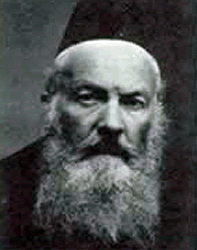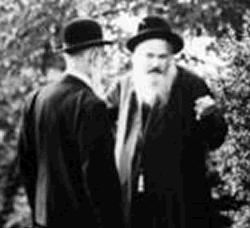|
Rabbi Elchonon Wasserman (Birz 1875- 1941 Kovno)
|
Biography Rabbi Wasserman was born in Birz, Lithuania. He studied in the Telshe Yeshiva in Telz, Poland under Rabbi Eliezer Gordon and Rabbi Shimon Shkop and also at Volozhin . Thereafter, he studied under Rabbi Chaim Soloveitchik in Brisk. He was appointed head of the Yeshiva of Amtshilov , where he won a reputation as an outstanding teacher. In 1907, after his marriage, he studied in the Kollel Kodshim in Radin, Russia, headed by the Chofetz Chaim. In 1910 he was appointed Rabbi of Brisk (now in Belarus), but during World War I returned to Radin. The yeshiva moved to Smilovichi and Rabbi Wasserman was appointed its Rosh Yeshiva . After the War, he moved to Baranowicze, Poland (now in Belarus) where he founded a yeshiva which became one of the most famous in Europe. He was one of the leaders of the Agudath Israel movement and was regarded as the spiritual successor of the Chofetz Chaim. Rabbi Wasserman had several sons. Rabbi Simcha Wasserman served as Dean of Yeshiva Beth Yehudah in Detroit in the 1940's, founded Yeshiva Ohr Elchonon in California in the 1950's, and later founded Yeshiva Ohr Elchonon in Jerusalem. Rabbi Wasserman's other sons were Naftoli and Dovid. When World War II broke out Rabbi Wasserman fled to Vilna, Lithuania, and in 1941, while on a visit to Kovno, was arrested by the Nazis with 12 other rabbis and sent to his death. Rabbi Elchonon Wasserman Rabbi Elchonon was taken and murdered by the Lithuanians on the 12th of Tammuz , 1941. Before he was taken he gave this statement: "In Heaven it appears that they deem us to be righteous because our bodies have been chosen to atone for the Jewish people. Therefore, we must repent now, immediately. There is not much time. We must keep in mind that we will be better offerings if we repent. In this way we will save the lives of our brethren overseas." "Let no thought enter our minds, God forbid, which is abominable and which renders an offering unfit. We are now fulfilling the greatest mitzvah. With fire she ( Jerusalem) was destroyed and with fire she will be rebuilt. The very fire which consumes our bodies will one day rebuild the Jewish people." Works Rabbi Wasserman was famous for his clear, penetrating Talmudic analysis. His popular works, essential material in yeshivos around the world, include: He also wrote Ikvasa di-Meshicha and published the responsa of the Rashba with annotations in 1932. His talmudic novellae appeared in the rabbinic journal Sha'arei Tzion (1929–34) and in other publications. http://en.wikipedia.org/wiki/Elchonon_Wasserman WASSERMAN, Elhanan Bunim.'amarim ve-igrot. V. 2-3. Yerushalayim: Yeshivat Or Elhanan Mekhon Ohel Torah, 760-<761 > [2000-<2000 or 2001 >] WASSERMAN, Elhanan Bunim. Sefer Shi`ure Rabi Elhanan: `al masekhtot Bava metsi`a, Bava batra / shi`urim kelaliyim she-ne'emru bi-shenot 688-689 `al yede Elhanan Bunem Vaserman ; ve-nirshemu `a. y. Sha'ul Kravits . Ba`arikhat Shelomoh Kravits. Pp. 419. Bnei Brak: Sh. Kravits, 758 [1997 or 1998] WASSERMAN, Elhanan Bunim. Kovets hosafot: ve-hu or hadash. Mi-divre torato shel Elhanan Bunem Vaserman. Pp. 141. [Israel?]: Mekhon Berit ha-Torah, 757 [1996 or 1997] WASSERMAN, Elhanan Bunim. Me'asef Ohel Torah: 4 halakim: Baranovits, 684-686. Mahadura mehudeshet. 1 v. [Israel?]: Mekhon Berit ha-Torah, 757 [1997] WASSERMAN, Elhanan Bunim. Be-hekbets: tamtsit ha-yesodot, ha-hidushim veha-be'urim u-mafteah ... `al ha-Shas / mi-kol sifre Elhanan Vaserman. Ne`erakh ve-yotse le-or la-rishonah `a. y. Yeshivat "Or Elhanan". Pp. 193. Yerushalayim: ha-Yeshivah, 751 [1990 or 1991] FINKELMAN, Shimon. The story of Reb Elchonon. Illustrated by Yosef Dershowitz. 1st ed. Pp. viii, 160. Brooklyn, N.Y.: Mesorah, c1984. |
Two sons survived the War: Reb Dovid who was in the concentration camps,
and Reb Simcha who remained in the U.S. after coming here with his
father to fundraise for the yeshiva - Ohel Torah in Baranovich. Reb
Dovid died in l975 and is buried in Eretz Hachaim cemetery near Bet
Shemesh. Reb Simcha died four years ago. He had no children. Reb Dovid
had two children: Elchonon, who died of cancer in l982, and Mina - who
is married to me. We live in Newton,Ma with our family.
.....story which Rav Simcha Wasserman told about his father, Rav Elchonon Wasserman, h'yd. Rav Simcha was sitting with his father sometime before WWII and R' Elchonon had just finished telling Rav Simcha that his role in life was to travel to areas where there was a dearth of Torah and spread Torah. In fact, this is exactly what Rav Simcha did, traveling to France, and America. Unfortunately, he and wife remained childless all their lives, but were spiritual parents to thousands of students in the various cities they lived.
Immediately after R' Elchonon had finished instructing R' Simcha that he would be traveling, a man entered to consult with R' Elchonon. The man wanted to move to America because of the ominous situation for the Jews at that time in Europe. R' Elchonon refused to give his approval, and said, "Better for your children to die a physical death here in Europe than die a spiritual death in America."
R' Simcha said that when he heard his father's words to this man, which immediately followed his instructions to his son to travel to Torah wastelands, he knew with certainty that he would never bear children. (Heard from Rabbi Akiva Tatz)
2 Cheshvan
Yahrtzeit of Rabbi Simcha Wasserman, a 20th century Torah sage and son of the illustrious Rabbi Elchanan Wasserman, who was martyred in the Holocaust. Rabbi Wasserman and his wife had no children, but together they educated tens of thousands of Jews in France, the U.S. and Israel. After Rabbi Wasserman's death, his wife died 10 days later. Rabbi Wasserman had a sixth sense about people; the story is told of him looking to purchase a used car in Los Angeles. He went to check out one particular car, and asked the owner if he could take it for a test drive. "How do I know you're not going to steal it?" the man said. Rabbi Wasserman then asked if he could use the telephone for a minute. He called the police and reported a stolen vehicle at that very address. The police arrived, confirmed that the car was indeed stolen, and arrested the man. "How did you know?" the police asked Rabbi Wasserman. "Simple," he said. "When I asked to take it for a test drive, he suspected that I'd steal it. Only a thief thinks that way

